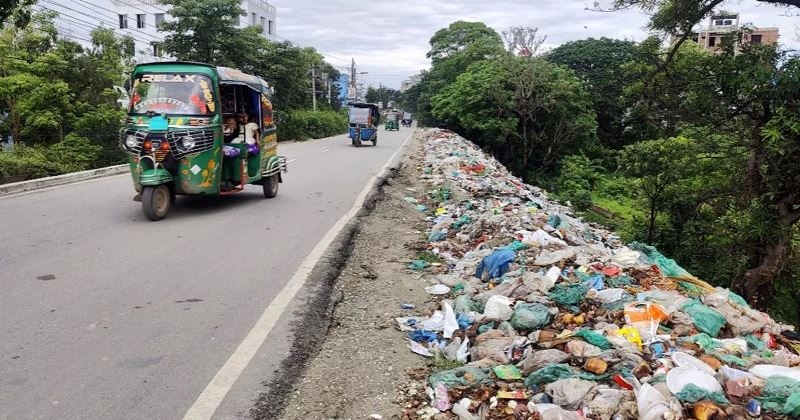- Intimidation or bloodshed cannot halt Bangladesh’s march to democracy |
- Khaleda Zia integral to an important chapter in BD history: Yunus |
- Enthusiasm marks Victory Day celebrations across Bangladesh |
- Dhaka-Delhi ties deep; to be shaped by trust, dignity, mutual respect |
- EU deploys election observation mission to Bangladesh |
Hajiganj Municipality suffocates from its own refuse

Refuse disposed beside the key road in Hajiganj municipal area
Chandpur, June 18 - Once known for its vibrant markets, bustling roads and deep-rooted heritage, Hajiganj municipality in Chandpur now groans under the weight of a crisis it can no longer ignore, a mounting sea of waste threatening the health and dignity of its people.
Every day, some 60 tonnes of waste are left scattered across this busy town, not in hidden corners or behind closed gates, but right in the heart of its daily life.
Streets, water bodies, bridges and even revered landmarks have become unwilling hosts to piles of filth that emit a stench strong enough to make passersby wince and residents fall ill.
The municipality, home to over 100,000 people and a floating population of up to 60,000 more, is among the more developed urban centres in the district.
Established in 1985 and upgraded to a first-class municipality in 2004, Hajiganj is crisscrossed by the bustling Chandpur–Cumilla regional highway and thrives on trade, education and local governance.
Yet, beneath the surface of its economic bustle lies a truth too foul to ignore as there is no designated dumping ground for its waste.
From early morning to late evening, cleaners under the municipality’s care collect around 30 tonnes of garbage..
Another 30 tonnes, equally offensive and potentially more dangerous, is dumped haphazardly by residents and businesses alike. Together, this wave of waste surges through Hajiganj daily with no sustainable outlet.
The result? Waste now lines key arteries of the town: from the Mithania Bridge on the Cumilla highway, to the Dakatiya Bridge on the Hajiganj-Ramganj road, past the rail crossing on Hajiganj-Kachua road and heartbreakingly close to the historic Hajiganj Boro Mosque.
The air is thick with the stench of rot and the acrid smoke from burning refuse, forcing the townspeople to breathe in danger with every breath.
Locals voice their agony with weary resignation.
“The smell and smoke have made our lives difficult,” said Abdur Rahim and Nasir Gazi from Paschim Bazar, adding, “Mosquitoes are everywhere, and dengue has returned with a vengeance.”
Children and the elderly suffer the most. Their fragile bodies react quickly to the polluted air — many coughing, wheezing, or bedridden with fever.
CNG driver Nurul Islam paints a grim picture of his daily route, “When we drive along the Hajiganj-Kachua road, the smell of rotting garbage is unbearable. And when it’s set on fire, the entire area disappears in smoke for hours.”
Despite repeated calls for action, the municipality appears cornered. Mahbubur Rashid, the assistant engineer (water and sanitation) of Hajiganj, admitted the bitter truth, “The municipality owns no land to set up a dumping station. We’re still using sites chosen by past administrations.”
Current administrator and Upazila Nirbahi Officer Md Ibne Al Zayed Hossain assured that efforts are being made to address the crisis. “We’re trying to remove the waste heaps. But for a lasting solution, we need mass awareness and public cooperation,” he said.
The situation is worsened by the near-complete absence of clean and accessible public toilets, a silent hardship that especially affects women, the elderly, and people with disabilities.
Hajiganj is not alone in this crisis. A study by the Asia-Europe Foundation shows that more than half of all waste in Bangladesh is dumped in the open. Uncollected and often burned in the open air, this waste poses massive threats — from polluting water sources to clogging drainage systems and exacerbating waterlogging even after light showers.
As towns grow and cities sprawl, so too does the tide of waste — unchecked, unmanaged and in many places, simply ignored.
Dhaka, the nation's capital, is already counted among the world’s most polluted cities. The United Nations Population Fund (UNFPA) warns that without urgent, coordinated measures, the waste problem will only worsen — not just in megacities but in smaller municipalities like Hajiganj.
Hajiganj’s predicament is a poignant reminder that development without planning leads not to progress, but to peril. Its streets echo with a silent plea — for dustbins over ditches, for solutions over stench, for a future where its children can play in parks, not pick through piles of refuse.
If ever there was a time for action, it is now. Before Hajiganj — and towns like it — are buried under the very waste they produce. - UNB

